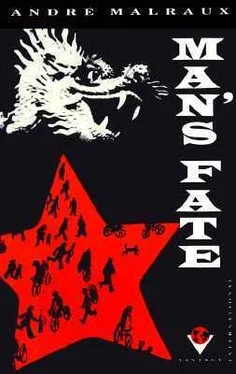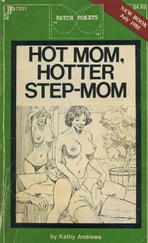“It’s a gift. It was sent me a little before one o’clock.” Clappique was reading the Chinese characters traced on the flat stake supporting the plant; a large one: Fidelity; three small ones, a signature: Ch’en Ta Erh.
“Ch’en Ta Erh. Ch’en. Don’t know him. Too bad. He’s a fellow who knows cactuses.”
He remembered that the next day he would have to be gone. He must find money to leave, and not to buy cactuses. Impossible to sell objects of art in a hurry with the city under military occupation. His friends were hard up. And you couldn’t touch Ferral for money on any pretext. He had commissioned him to buy some of Kama’s wash-drawings when the Japanese painter arrived. Thirty or forty dollars in commissions.
“Kyo should be here,” said Gisors. “He had many engagements today, didn’t he?. ”
“He’d do better to miss them, perhaps,” Clappique grunted.
He did not dare to add anything. He had no idea how much Gisors knew about Kyo’s activity. But the absence of any question humiliated ^m:
“You know, it’s very serious.”
“Everything that has to do with Kyo is serious for me.”
“You haven’t any bright idea about how to earn or find four or five hundred dollars immediately?”
Gisors smiled sadly. Clappique knew he was poor: and his works of art, even if he were to consent to sell them.
“Well, let’s earn our few cents,” the Baron thought to himself. He came closer, looked at the wash-drawings scattered on the divan. Although he was sufficiently discriminating not to judge the traditional Japanese art in terms of its relation to Cezanne or Picasso, he detested it today: the taste for serenity is weak in hunted men. Dim lights over a mountain, village streets dissolved by rain, flights of wading-birds across the snow-that whole world in which melancholy prepared one for happiness. Clappique imagined without difficulty, alas, the paradises at whose gates he should remain, but was irritated by their existence.
“The most beautiful woman in the world,” he said, “naked, aroused, but with a chastity belt. For Ferral, not for me.”
He chose four, dictated the address to the disciple. “Because you’re thinking of our art,” said Gisors; “this does not serve the same purpose.”
“Why do you paint, Kama-San?”
The old master was looking at Clappique with curiosity, the light emphasizing his bald head. He too was wearing a kimono. (As Gisors was still in his dressing- gown, Clappique was the only one in trousers.)
The disciple left the sketch, translated, answered: “The master says: first, for my wife, because I love her. ”
“I don’t say for whom, but for what?”
“The master says it is difficult to explain to you. He says: ‘When I went to Europe, I saw the museums. The! 86
more your painters paint apples, and even lines which do not represent obj ects, the more they talk about themselves. For me it is the world that counts.’ "
Kama spoke another phrase; an expression of gentleness, barely perceptible, flitted across his face, which resembled an indulgent old lady’s.
“The master says: ‘With us, painting is what charity would be with you.’ "
A second disciple, a cook, brought bowls of sake, and immediately withdrew. Kama spoke again.
“The master says that if he were no longer to paint, it would seem to him that he had become blind. And more than blind: alone."
“Wait a minute!" said the Baron, one eye open, the other shut, his forefinger pointed. “If a doctor were to say to you: ‘You have an incurable illness, and you will die in three months,’ would you still paint?"
“The master says that if he knew he was going to die, he thinks he would paint better, but not differently." “Why better?" asked Gisors.
He did not cease thinking of Kyo. What Clappique had said upon corning in was sufficient to worry him: today serenity was almost an insult.
Kama answered. Gisors himself translated:
“He says: ‘There are two smiles-my wife’s and my daughter’s-which I should then know I would never see again, and I should be even more inclined to melancholy. The world is like the characters of our writing. What the symbol is to the flower, the flower itself-this one (he pointed to one of the drawings)-is to something. Everything is a symbol. To go from the symbol to the thing symbolized is to explore the depth and meaning of the world, it is to seek God.’ He thinks that the approach of death. Wait. ’’
He questioned Kama again, resumed his translation:
“Yes, that’s it. He thinks that the approach of death would perhaps permit him to put into all things sufficient fervor and melancholy, so that all the forms he would paint would become comprehensible symbols, so that what they symbolize-what they hide, also-would be revealed.”
Clappique experienced the atrocious sensation of suffering in the presence of a creature who denied suffering. He was listening with attention, without taking his eyes from Kama’s face, while Gisors was translating. With his absorbed look, his elbows against his sides, his hands joined, Clappique resembled a forlorn monkey.
“Perhaps you’re not asking the question in the right way,” said Gisors.
He spoke a very short phrase in Japanese. Up to this point Kama had answered almost immediately. He pondered.
“What question did you just ask ^m?” Clappique asked in a low voice.
“What he would do if the doctor condemned his wife.”
“The master says he would not believe the doctor.”
The cook-disciple came back and took away the bowls on a tray. His European garb, his smile, his deference, and his gestures which betrayed an extravagant gayety-everything about him seemed strange, even to Gisors. Kama said something under his breath which the other disciple did not translate.
“In Japan these young men never drink wine,” said Gisors. “He feels hurt because this disciple is drunk.”
His eyes looked away into space: the outside door opened. A sound of steps. But it was not Kyo. His look once more became precise, and met Kama’s firmly:
“And if she were dead?”
Would he have pursued this conversation with a European? But the old painter belonged to another universe. Before answering he smiled a long, sad smile, not with his lips but with his eyelids:
“One can communicate even with death. It’s most difficult, but perhaps that is the meaning of life. ”
He was taking his leave, was returning to his room, followed by his disciple. Clappique sat down.
“Not a word!. Remarkable, my dear, r-remark- able! He left like a well-bred phantom. Do you know that young phantoms are very ill-bred and that the old ones^ have the greatest trouble teaching them to make people afraid-the young ones don’t know any language, and aU they can say is: Zip-zip. Which. ”
He stopped: the knocker, again. In the silence, guitar- notes began to strum; soon they became ordered into a slow fall that spread outward in its descent, down to the gravest notes, held in suspense and lost at length in a solemn serenity.
“What does it mean, but what does it mean?”
“He plays the samisen. Always, when something has upset him: away from Japan, it’s his defense. He told me, when he came back from Europe: ‘I know now that I can find my inner silence no matter where I am. ’ ”
“A bluff?”
Clappique had asked the question absent-mindedly: he was listening. At this hour when his life was perhaps in danger (although it was rare that he was sufficiently interested in himself to feel himself really in danger) those exquisitely pure notes, bringing back to him upon their current, along with the love of music which had filled his youth, that youth itself and all its vanished happiness, upset him too.
Читать дальше











